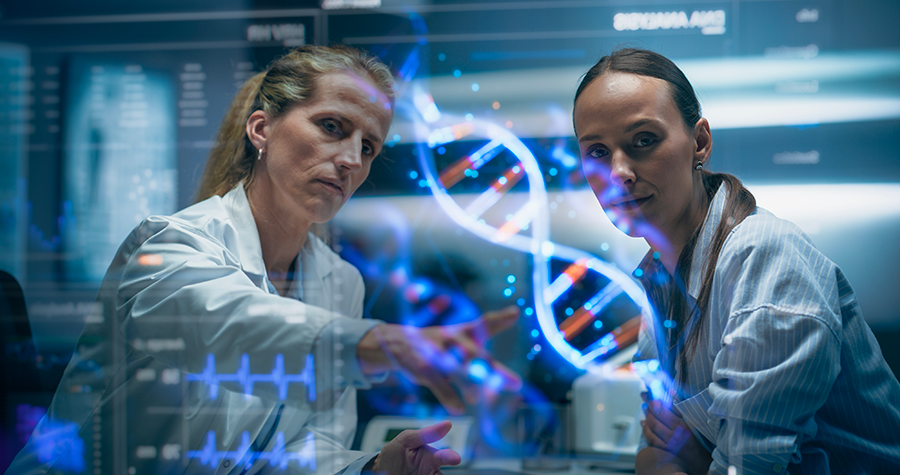Whether it could reduce times for medicine marketing authorizations or improve therapeutic adherence, artificial intelligence combined with scientific innovation is paving the way for extraordinary opportunities. Interview with Brice Miranda, Group Chief Data & AI Officer at Servier, on the transformations occurring in the pharmaceutical industry sparked by this revolutionary technology.
Hello Brice and thank you for your time today. First of all, could you tell us how artificial intelligence has impacted the different steps of the Servier value chain?

Brice Miranda : “Artificial intelligence is a transformative technology. It impacts every business area in our value chain in all of our therapeutic areas:
These are just a few examples of the many ways AI is used in our value chain. Improving pharmacovigilance, fighting against counterfeit medicines… The list goes on and on! “
What changes are being made by Servier to put AI at the heart of its transformation?
BM: “The Executive Committee approved a list of around 60 priority applications that we are focusing on and that cover all of the Group’s activities. As part of this plan, we are especially dedicated to helping our employees adapt to these changes. For every project involving AI, we must plan this support upstream and include it in our overall training and acculturation strategy.
At the same time, we also have to “demystify” artificial intelligence and share our vision on a wide scale: employees who are assisted by AI – I like to use the term “augmented humans” – but not replaced by it.
In addition, we are expanding our expertise with help from skilled partners such as Google Cloud, whose generative AI solutions are currently being rolled out across our entire value chain. We chose this partner for their ability to provide a cutting-edge data platform and for their unique appetency for healthcare. We also work with Owkin – a French unicorn biotech company with promising results – and Aitia, the market leader for digital twins and causal AI technology.”

How medical innovation is transforming society
Precision medicine, increased healthcare system agility, improved care pathways… AI enables innovations whose impact extends beyond the pharmaceutical industry. Discover how medical innovation is transforming society and shaping the future of healthcare.
What challenges arise from the use of AI in the pharmaceutical industry?
BM: “To use artificial intelligence to its full potential, the pharmaceutical industry must meet a number of challenges. The first is, of course, technical:we have to acquire the right tools. In fact, that is why we have formed the strong partnerships that I mentioned earlier.
This technical challenge comes with a data challenge. To provide conclusive results, AI systems require significant volumes of high-quality, correctly governed data. This is a challenge we must rise to collectively. While it is up to the Data Factory teams to roll out a state-of-the-art data platform, it is also the business areas’ responsibility to supply that data platform with data that is easily accessible, interoperable and reusable – and therefore well documented – and of excellent quality. This joint responsibility will guide us toward success. And that perfectly illustrates our third challenge: employee buy-in, which I briefly mentioned earlier. Tools that rely on AI to function can only create value if they are used to their full capacity. It is therefore crucial that we anticipate our teams’ training needs and make change management a priority. The last challenge deals with ethical issues. Over the past several months, the Group has focused on defining the boundaries of responsible artificial intelligence.”
How do you think artificial intelligence will continue to transform the pharmaceutical industry over the coming years?
BM : “I think this quote from Bill Gates provides a partial answer to that question: “We always overestimate the change that will occur in the next two years and underestimate the change that will occur in the next ten.” In my opinion, his words really reflect AI’s future impact on society.
We are facing a tidal wave of innovation comparable to when the internet and smartphones arrived. All the conditions necessary for this wave to unfurl at full strength are in place: theoretical algorithms and models are ready, technology has never before been so powerful, and we have enough data to supply artificial intelligence systems. This has all resulted in a competitive spirit that leads to extraordinary progress every day.”
